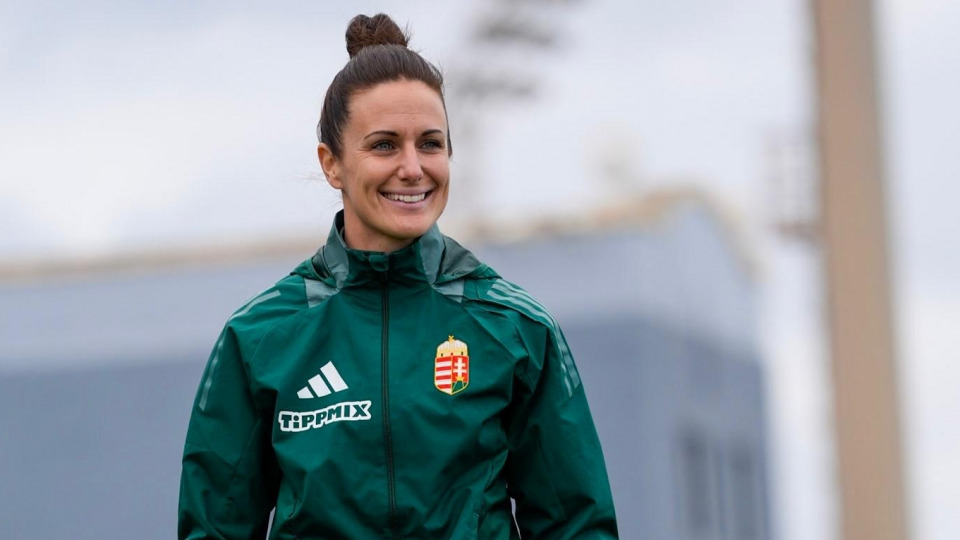Alexandra Szarvas: "To me, players' personalities are most important"

The head coach of the Hungarian women's national team got her first opportunity to play abroad at the age of 18 and although she retired early, she didn’t distance herself from the football pitch. Following success as a coach in Switzerland, she returned home and was soon appointed head coach of Hungary Women in time for the European Championship qualifiers.
Alexandra Szarvas started playing football with local boys in the town of Fót and continued in a boys team in Gödöllő under the guidance of László Lovrencsics, the father of the former 44-time Hungarian national team player Gergő Lovrencsics. Szarvas represented Ferencvárosi TC and Viktória FC in her own country before joining Bayern Munich and later, VfL Sindelfingen. She then left Germany for Kriens in Switzerland and finished her playing career at FC Basel. The former 30-time Hungarian international can count among her honours the Hungarian championship, the German Cup and two Hungarian Cups.
"While a player, I was already quite conscious that I wanted to plan my career. I was always very interested in tactics; I liked to know why we did what we did in training. I often asked my coaches questions on these things," Szarvas explained.
At the age of 25, she retired from playing and earned her coaching licence in Switzerland within a year, immediately receiving an opportunity to lead a boys' youth team.
"It wasn't an injury that made me quit football so early. I consider myself very passionate, and in the six months leading up to my decision, I felt my passion had been fading. I played for three years at FC Basel, a club where I was the vice-captain and about which I cared deeply. Unfortunately, towards the end, I had such negative experiences with coaches that my love for football completely drained away. Having said this, I'm very grateful for my years in Switzerland - I was surrounded by people who fully accepted me and contributed significantly to my development. I also had a great relationship with the former Hungarian national team coach, Edina Markó, which made it even harder to tell her about my decision. I stopped playing football in June 2017 and started coaching in August as the head coach of FC Rapperswil-Jona's U13 boys' team."
Alexandra Szarvas became the first female coach in Switzerland to lead a U16 boys team when she took charge of FC Thun's youth squad.
"The club contacted me, which was a great honour. When I signed my contract, the managers of the club said, 'It doesn’t matter whether you're a man or a woman; the only thing that matters is that you're good at what you're doing.' Many people ask me what it was like to be a coach of a boys' team as a woman and I must say that because they respected my knowledge, I was fully accepted."
Later, Szarvas worked as an assistant coach for the Swiss women's youth national teams alongside her former coach, Kaan Kahraman. He's had the greatest influence on her, both as a player and as a coach, and they still maintain a strong relationship. In the summer of 2023, she returned to Hungary at the request of Dr Róbert Barczi, MLSZ's Sports Director, to coach the Hungarian U19 women's national team and in March 2024, just before the start of the European Championship qualifying campaign, Szarvas was appointed the head coach of the Hungary's senior women's team.
"I was surprised by the offer. It'd been discussed as a future possibility when I'd joined the Federation, but I didn’t expect it to happen so soon. However, I didn’t hesitate at all to accept, even though stepping in wasn't easy, because fifteen days isn't enough to prepare for a European qualifier. I even sought advice from one of the world’s best coaches, Sarina Wiegman, the head coach of the English women’s national team. Her initial reaction was simply, 'Fifteen days? Good luck!' She was kind enough to give me some useful tips though."
Hungary were drawn in a group with Azerbaijan, Turkey and Switzerland in the qualifiers, the latter team of which meaning the two matches against them was sure to be a special experience for Szarvas. She knew the Swiss squad well and that had a positive effect on the team's performances, helping Hungary defeat the strongest opponent in the group, their most impressive success of the qualifying phase.
"It was a unique feeling to play a European qualifier as the Hungarian head coach at the exact same place where just two years ago I'd been coaching the Swiss U19 women’s team. It was great to see some of my former players on the pitch, now representing the Swiss senior team. After our home victory against them, several former colleagues reached out to congratulate me."
After nine months at the helm of the women's national team, Alexandra Szarvas says that although the team has made progress in terms of mentality, one of the biggest challenges in Hungarian women's football is still the lack of confidence of the players.
"They need to believe that they can be better than the world-class opponents standing in front of them on the pitch!"
She emphasises that the players should prepare for the trainings and the matches even more conscientiously. It's crucial that they reflect on their performance after each match and review their progress year on year, as ultimately, every player is responsible for their own career.
Szarvas also noted that Hungarian women's football is still lagging behind when compared to neighbouring countries, not to mention elite national teams. Most Central European nations have already seen their youth or senior teams compete in the European Championship, while Hungary is still waiting for such a breakthrough. According to her, closer cooperation between the Federation and clubs could lead to significant improvements.
"We've had an incredibly intense year. I consider myself very lucky to work with such professional staff in such a supportive environment. Amongst others, I have the support of highly qualified and respected professionals such as my mentor Nils Nielsen, the head coach of the Japanese women's national team, who also worked in the Swiss national-team setup, and to whom I owe a lot. The most important thing for me is to ensure the development of the national team and, together with my staff, to bring out the best in the players. I always prioritise personality, because every player is also a valuable person who wants to give their best for the national team. I try to get to know my players' personalities as much as possible. There's a lot for footballers to take on board at their clubs, so during the ten-day training camps we try to create a positive and energetic atmosphere which brings every team member together on the same wavelength. That is our top priority; tactics, analysis and then everything else comes after that. As for me, I often put everything else before myself, which has significantly reduced my 'me time' recently. I no longer play football, but I go running outdoors and do some strength training at the gym. Unfortunately, personal exercise has taken a backseat in my life. The one thing that truly helps me unwind is travelling. This summer, I had the chance to attend the Paris Olympic Games and cheer on one of my best friends, Kinga Janurik, the goalkeeper of the Hungarian women's national handball team. Kinga also comes to our matches, and the girls see her — and the entire handball team — as role models. I firmly believe that one day, we will achieve similar successes to theirs!"
Alexandra Szarvas announced on Monday the squad for the first two matches of the Nations League series against Belarus and Finland.
A hírkategória további hírei
2025-10-25 00:19:18
Hungary Women put four past Luxembourg
2025-05-22 21:03:39
FTC-Telekom lift sixth consecutive Hungarian league title
2025-04-26 01:00:39
ETO FC Győr take Women's Hungarian Cup glory for fourth time in a row
2025-04-06 23:38:43











